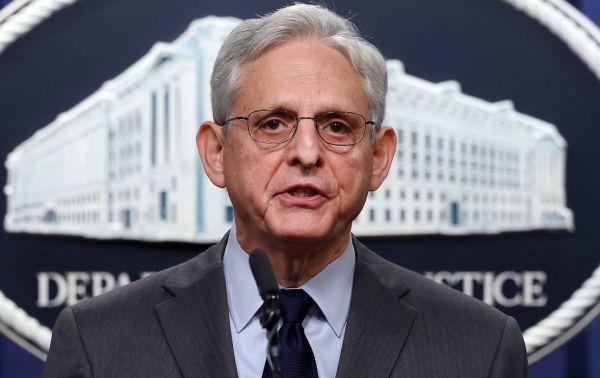No surrender
Scandal, and the media’s power either to declare its existence or to withhold such declaration, is the revolutionary left’s chosen method of getting and retaining power in our time. Working in cooperation with elected and unelected Democrats as well as the FBI, the Justice Department and other elements of the deep state, the media can, at need, establish a whole fabric of moral and criminal history out of legal gossamer, as they have been doing with Donald Trump since he came down the escalator at Trump Tower, to taint and ultimately render unelectable anyone who threatens their power.
All the elements of this elite coalition are essential to its success, but the media constitute its leading element. Only they have the power to manipulate public opinion in this way, to establish a consensus — a consensus reaching even far into the Republican and conservative opposition — in favor of what they like to portray as the new decency. Trumpism today is what not wearing the uniform of one’s class or not staying married to the same spouse was in the old days: it simply isn’t done, not by anyone with aspirations to social acceptance or respectability among the elites.
The corollary is of course that the media also have the power to suppress scandal when it comes to their own people, as it has lately come to President Biden and his family. But, unlike the power of scandal promotion, that of scandal suppression may prove to have its limits. No one can accuse the media of not reaching new heights of disingenuousness and mendacity in their attempts over the past three years (four years if you count the first Trump impeachment) to stifle the scandal of Hunter Biden’s influence-peddling when his father was vice-president. But now that it is obvious to all but the most extreme partisans that Joe Biden was heavily involved in his son’s “business” dealings, the ultimate test of the media’s powers appears to be at hand.
And Mr Trump, now thrice indicted — each time on laughably flimsy charges — continues to serve as the scandal-magnet he has always been, but the contrasting example provided by the IRS “whistle-blowers” of the treatment of Hunter Biden by the media’s and the Democrats’ many allies in the permanent government, ought to make it plain to even the most rabid Trump-haters that, as the estimable Mollie Hemingway puts it, “we have a Department of Justice that is working to literally imprison their top political opponent, of the current president, and has been using all sorts of powers to go after him.”
Yet so accustomed are we to the media’s partisan scandal-mongering that even many Republicans take it for granted, like the perennial ballot-box stuffing in Democratic strongholds like Chicago or Philadelphia. It would be surprising if ordinary, non-political people weren’t beginning to catch on to the ways they are being manipulated by means of the media scandal machine, and there is some evidence that they are. According to Gallup
Just 7% of Americans have “a great deal” of trust and confidence in the media, and 27% have “a fair amount.” Meanwhile, 28% of U.S. adults say they do not have very much confidence and 38% have none at all in newspapers, TV and radio. Notably, this is the first time that the percentage of Americans with no trust at all in the media is higher than the percentage with a great deal or a fair amount combined.
Something similar is going on with the FBI and the Department of Justice. An NBC News poll released over the summer showed that “Thirty-seven percent of registered voters surveyed said they have a positive view of the FBI, while 35% said they have a negative view. Views of the agency have soured since October 2018, when 52% of Americans had a positive opinion of the FBI and just 18% had a negative view.” Among Republicans, however, only 17 per cent had a positive view while 56 per cent had a negative one. The numbers for the Department of Justice were similar.
Such results, as firm indicators of “institutional disintegration” were shocking to, among others, Daniel Henninger of The Wall Street Journal, but they can’t have come as a complete surprise. Trust in the media, certainly, has been not far off this rock bottom level for decades, and it has been clear at least since the election of Donald Trump that the FBI has taken a similar turn into outright partisanship in its enforcement of the law. What is shocking to me is that the FBI and the Justice Department under Merrick Garland seem no more concerned about their plummeting reputation for probity than the media are concerned about theirs.
In the media’s case, the post-Trump business model depends on their forfeiting the trust of those who don’t agree with them in order further to cement their attachment to those who do, and who seem never to tire of hearing their own views of political things repeated back to them. Such a strategy may not work in the long term. The Washington Post, for example, is said to have lost half a million digital subscribers (down from a high of three million) since President Trump left office and to be on course to lose $100 million this year. But what other option does the paper have by now, other than to keep preaching to an ever-diminishing choir? In any case, to the Post’s owner, Jeff Bezos, $100 million is pocket change, and I don’t see its proud partisanship changing anytime soon — or that of the rest of the media.
It’s different with the FBI and the DoJ. You would think that those whose constitutional function depends upon their continuing to enjoy the public trust would at least make some effort, however disingenuous, to reassure the public that they remain fair and impartial ministers of the law. At the very least these government agencies must surely evince a trifle of embarrassment at being seen to pull a full Inspector Javert on the former president while treating the current president and his son, whose misdeeds are far more obvious to begin with and are becoming more obvious with each passing day, as mere peccadillos deserving only of a fine and probation.
And yet no such embarrassment do we see. The left has institutionalized double standards over the past ten years, and slaps down any objection with the charge of “whataboutism” — that being the contemptuous name given in sinistral precincts today to what used to be called the Kantian categorical imperative — or the Golden Rule. That must be why FBI director Christopher Wray continues to stonewall where he can and delay where he cannot the Republican House Oversight Committee’s investigations into the Biden family while showing his contempt towards the congressional investigators looking into its dubious activities.
Meanwhile, General Garland continues openly to emulate Captain Ahab in his implacable determination to, as the editor of this journal succinctly puts it, “Get Trump.” Soon we may expect to hear some DoJ equivalent of Leonard Downie Jr. (see “Scandalum scandalorum” in The New Criterion of March, 2023) or Jim Rutenberg (see New Criterions of the past seven years, passim) piping up to tell us that politically motivated selective prosecutions (and non-prosecutions) are the new objectivity and fairness, and are essential to the survival of Democracy.
The total politicization of the Justice Department — for example in what is being called the new, “January 6 jurisprudence” invented out of ideological whole cloth to go after the Trump supporters in the Capitol and, ultimately, Mr Trump himself — is not even controversial anymore in their eyes or, apparently, those of the legal establishment. It’s just the way it is, and the way it must always be for so long as the coalition of the media and the Democrats and the deep state holds up. That’s clear enough, and yet the mystery remains as to how such people can continue to thumb their noses at public opinion as it grows ever more cognizant and disapproving of their corruption. I can’t help thinking that the apparent unconcern of the security services, as of the media, about their devastatingly poor public image reflects a quiet confidence that there will never be another Republican president, at least not one who could or would ever dare to take on a media-deep state complex with the power to ruin by promoting endless manufactured scandals anyone who opposes it.
But how, you may ask, can our new oligarchs be so sure that the civilians and foot-soldiers of the national Democratic party, excluded from power themselves but willing accomplices of the established elite who are so jealous of their own, will not wake up one day and realize that they are being used by unscrupulous and power-hungry officials, both elected and unelected, to keep themselves in power and those they hate out of it?
The answer, I think, lies in the peculiarly social nature of ideology. There is a widespread idea about these days that we are all ideologues, even if we don’t know it. The amiable Marxist Professor Terry Eagleton, writing for UnHerd, expresses this belief well when he writes that:
people don’t tend to regard their own beliefs as ideological, any more than people go around calling themselves Spotty or Fatso. Ideology is what the Other has. . . Other people’s beliefs are ideological in the sense of being rigid, doctrinaire, immune to argument and detached from the practical world, whereas one’s own convictions are flexible, pragmatic and eminently reasonable.
Yet for all these similarities between the adherents of opposite political views, I think there is still a distinction to be made between them. For there is no comparable social dimension to the opinions of ordinary, non-ideological folk. Such people can admit to error and change their mind, where the ideologue cannot do so without apostatizing and abandoning a social and intellectual identity for the sake of which he became an ideologue in the first place.
It’s true that ideology tends to beget ideology as an equal and opposite reaction to itself. More and more, as the right seeks to establish an ideology of its own, usually called either “capitalism” or “nationalism” or both, so that it can match the idealistic fervor of the other side in opposing it, there is coming to be a social dimension to the hitherto non-ideological side to go together with its ersatz, cobbled together ideology. This is a regrettable development and part of what lies behind what Bill Bishop calls “the Big Sort” of Americans into ideologically (in the popular sense) exclusive communities.
But just because the right’s ideology is an intellectually feeble thing compared to the sleek and often brilliantly engineered if utterly wrong-headed left opposition, it follows that the right must still retain something of the old, non-ideological modes of thought — enough, at any rate, to change, if slowly, with changing circumstances as the rigid ideologue cannot do. Just because he believes in the ultimate truth of his perfect system of social organization, the latter must classify all the world into one of only two categories, fellow believers and unbelievers. And if, with the help of the media and the entertainment industry, the true ideologues have managed to cast a degree of shame, however small, on the unbelievers, those who have once voted for Democratic Truth or against Republican indecency will ever after be most reluctant to vote any other way. That’s why Republicans are much less likely to think, and vote, in lockstep with one another than Democrats do, and therefore why they are much more likely to change their minds.
An illustration of how ideology inevitably becomes self-reinforcing in this way was recently provided by Helen Joyce, an Irish journalist and author of Trans: When Ideology Meets Reality, in an interview with Peter Boghossian:
Something you may not have thought of is that there are a lot of people who can’t move on from this [i.e. the “transgender” ideology]. And that’s the people who have transitioned their own children. So those people are going to be like the Japanese soldiers who were on Pacific islands and didn’t know the war was over. They’ve got to fight forever. This is another reason why this is the worst, worst, worst social contagion that we’ll ever have experienced. A lot of people have done what is the worst thing you could do, which is to harm their children irrevocably, because of it. Those people will have to believe that they did the right thing for the rest of their lives, for their own sanity, and for their own self-respect. So they’ll still be fighting, and each one of those people destroys entire organizations and entire friendship groups.
Admittedly, this is an extreme case. For most ideologues and those loosely of the ideological fellowship for social reasons, it is not a “fight to the death” as Ms Joyce says that of the trans parents is. But to the extent that they have chosen to make their political views into a central fact of their identity and the means of attaching themselves to what Ms Joyce calls “friendship groups” they will find it to the same extent difficult to question the ideology, let alone change their minds about any policy or candidate the ideology may choose to endorse.
This example of the working of an ideological ratchet has been extended by Leor Sapir of City Journal to “doctor-activists like Jack Turban, Meredithe McNamara, and Johanna Olson-Kennedy who have tethered their careers, finances, and personal reputations to ‘gender-affirming care.’” But why should it not also be extended to those who have gone far out onto a moral limb in defense of the Bidens, or on the attack against Trumpian conservatives (also known as racists, fascists, etc) and Mr Trump himself?
It seems probable that the horrific death toll of both the Russian and the Chinese revolutions of the last century also owes something to the need of the revolutionaries to justify previous atrocities by committing more of them, the more the revolution fell short of their expectations. Our own home-grown revolutionaries of today are busily destroying the customary, legal and constitutional order of centuries in the name of an “anti-racism” that is more racist than ever and an “anti-fascism” which is itself hardly distinguishable from fascism — all because it is unthinkable to them to admit that they, or their ideology, have been wrong.
All such people are in a similar position, if not to the same degree, as the parents who have “transitioned” their children and who could not live with themselves if they looked unblinkingly at what that has meant, or is likely to mean, for the children. Like the Japanese soldiers in the Philippines who fought on after 1945, they too will continue to fight — at least for so long as they continue to cling to the progressive ideology with which they have so completely identified themselves and to which they have committed their lives, their fortunes and their sacred honor. The only remaining question is when or whether the admiration of their many ideological fellow-travelers will turn to pity, like that of Helen Joyce, for those whose delusions are necessary for their continued existence.
Discover more from James Bowman
Subscribe to get the latest posts to your email.







